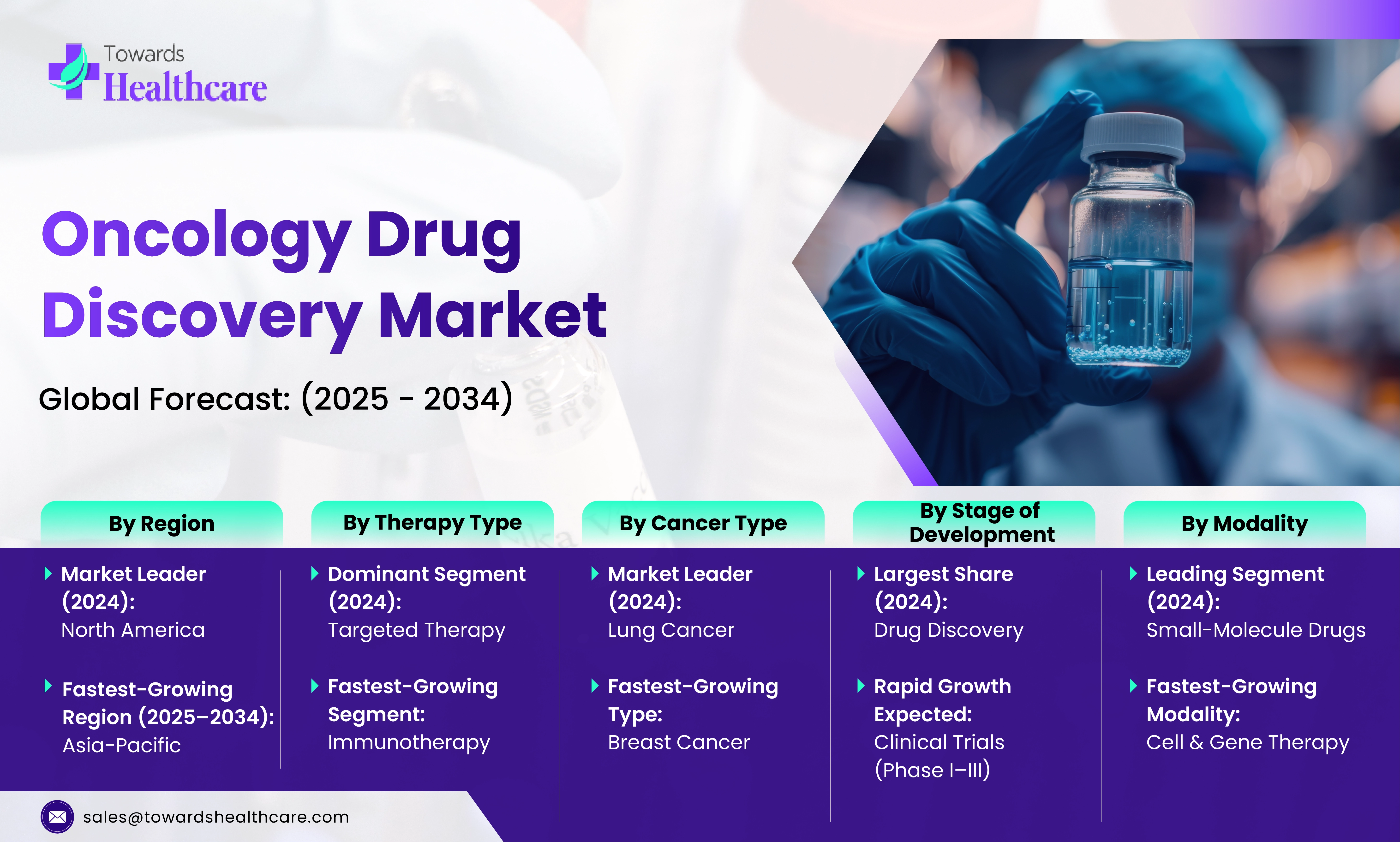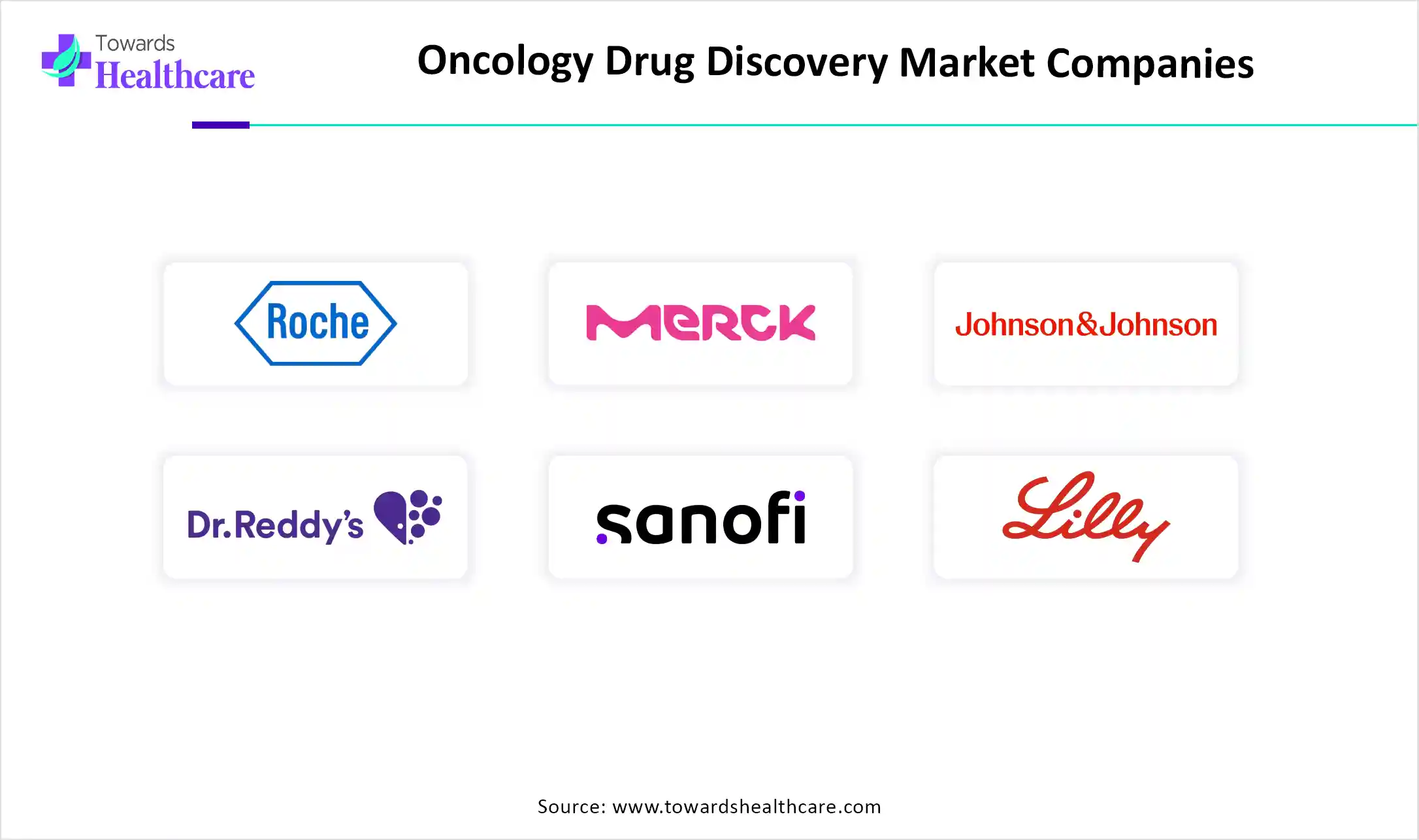February 2026

The oncology drug discovery market is poised for significant expansion from 2024 to 2034, driven by rapid advancements in precision medicine, AI-enabled drug development, and a growing pipeline of targeted therapies. The increasing global cancer burden, coupled with rising investments from both public and private sectors, is accelerating research efforts to identify novel biomarkers and therapeutic targets.

The oncology drug discovery market is experiencing significant growth driven by the rising global cancer burden and increasing demand for more effective, personalized treatments. Technological advancements in genomics, molecular biology, and AI-driven drug discovery are enabling faster and more precise identification of potential cancer targets. Additionally, growing investments from pharmaceutical companies and government support for cancer research are fueling innovation. The market is also benefiting from a strong pipeline of novel therapies, including immunotherapies and targeted drugs, aimed at improving patient outcomes and survival rates.
Oncology drug discovery is the scientific process of identifying and developing new medications specifically designed to prevent, treat, or cure cancer. It involves targeted identification, compound screening, preclinical testing, and optimization of drug candidates to ensure safety and effectiveness before advancing to clinical trials. Innovation is significantly transforming the oncology drug discovery market by enabling faster, more precise, and cost-effective development of cancer therapies. Advances in genomics, artificicla intelligence, and high-throughput screening are helping researchers identify novel targeted and design are helping researchers treatments. Immunotherapies, CAR-T cell therapies, and targeted drugs are merging as promising approaches, improving treatment outcomes. These innovations are also reducing trial and error in drug development, accelerating timelines, and attracting greater investment from pharmaceutical companies and research institutions.
For Instance,
AI is revolutionizing the market by accelerating the identification of drug targets and optimizing compound screening. It enables analysis of vast genomic and clinical datasets to uncover cancer-related mutations and predict drug responses. AI also enhances the efficiency of preclinical and clinical trial designs, reducing time and cost. By improving accuracy in drug development and personalizing treatment strategies, AI is helping bring more effective cancer therapies to market faster.
Increasing Cancer Incidence
The rising incidence of cancer globally fuels demand for more effective and targeted treatments, driving innovation in oncology drug discovery. As cancer increases, there is a heightened urgency to develop novel therapies that can improve survival rates and quality of life. This growing disease burden attracts significant investments from pharmaceutical companies and research institutions, accelerating the development of advanced drug technologies, including immunotherapies and personalized medicine, to meet the evolving healthcare needs.
For Instance,
High Cost and Lengthy Development
While the high cost and lengthy development process act as key restraints for the oncology drug discovery market, they often hinder innovation and delay patient access to new treatments. Developing effective cancer therapies requires substantial investment, complex research, and long clinical trials, with no guarantee of success. These financial and time-related burdens limit participation from smaller biotech firms and slow down the overall pace of progress, making it difficult to meet the urgent demand for advanced cancer treatments.
Precision Medicine and Genomics
The integration of precision medicine and genomics in oncology drug development offers a promising future by enabling the discovery of novel biomarkers and genetic alterations linked to various cancers. This approach supports the development of therapies tailored to specific tumor profiles, improving drug response rates. Advancements in genome sequencing and data analytics are making it easier to identify patient subgroups, leading to more efficient trials and better-targeted treatments, ultimately transforming how cancer is diagnosed and treated.
For Instance,
In 2024, the targeted therapy segment dominated the oncology drug discovery market due to rising demand for treatment that can overcome resistance seen with conventional chemotherapy. These therapies often offer more favorable outcomes for long-term use. Additionally, pharmaceutical companies increasingly focused R&D efforts on targeted molecules due to their strong clinical success rates and commercial viability, leading to a surge in new approvals.
For Instance,
The Immunotherapy segment is projected to grow at the fastest rate in the oncology drug discovery market due to its ability to harness the body’s immune system to fight cancer more effectively and with fewer side effects. Breakthroughs in immune checkpoint inhibitors, CAR-T cell therapy, and cancer vaccines have shown promising clinical outcomes. Rising approvals, ongoing research, and increasing demand for durable, targeted treatments are further accelerating investment and innovation in the market.
In 2024, the lung cancer segment led the market as it remained one of the most frequently diagnosed cancers with complex subtypes requiring diverse treatment approaches. The rising number of smokers in certain regions, increasing exposure to environmental pollutants, and late-stage diagnosis rates have intensified the demand for novel therapies. Additionally, pharmaceutical companies prioritized lung cancer in clinical pipelines due to its large patient base and potential for targeted and immunotherapy development.
For Instance,
The breast cancer segment is expected to witness the fastest growth in the oncology drug discovery market due to the rising number of younger patients being diagnosed and the increasing focus on aggressive and treatment-resistant subtypes like triple-negative breast cancer. The demand for innovative therapies addressing recurrence and metastatic cases has also surged. Moreover, collaboration between biotech firms and academic institutions is boosting the development of novel drugs, contributing to the rapid expansion of the market.
In 2024, the drug discovery segment dominated the market as pharmaceutical companies focused on expanding their early-stage pipelines to address rising cancer diversity and drug resistance. The need to explore new therapeutic classes and uncover first-in-class molecules led to a significant rise in exploratory studies. Moreover, collaboration between academia and industry has intensified at this stage, enabling a broader scope of innovation before entering costly clinical development phases.
The clinical trials (Phase I, II, III) segment is projected to grow rapidly due to the rising complexity of cancer types requiring in-depth safety and efficacy evaluation. The emergence of combination therapies and adaptive trial design has increased the need for flexible multi-phase clinical studies. Moreover, growing collaboration between biotech firms, CRO’s, and research institutions is streamlining trial execution, allowing more oncology candidates to enter and progress through clinical stages with efficacy during the study period.
In 2024, the small-molecule drug segment held the largest share in the market as researchers increasingly relied on these agents to modulate key signaling pathways and enzyme functions in cancer cells. Their chemical stability and ability to be administered orally or intravenously make them suitable for long-term treatment regimens. Additionally, pharmaceutical companies favored small molecules due to their compatibility with traditional screening methods and lower development complexity compared to biologics.
The cell and gene therapy segment is expected to grow at the fastest rate in the oncology drug discovery market as researchers shift focus towards personalized and regenerative cancer treatments. These therapies modify patients' cells or genes to precisely attack cancer, offering new hope for hard-to-treat tumors. The growing success of experimental treatment in early trials, coupled with expanding infrastructure for advanced therapy manufacturing, is driving momentum and investment in this highly innovative modality.
North America led the market in 2024 largely due to its high concentration of clinical trials and strong collaboration between academia, biotech startups, and government agencies. The region's proactive approach to cancer research funding and early adoption of breakthrough therapies supported faster innovation cycles. Moreover, the availability of advanced diagnostic tools and a large, diverse patient pool for research made it an ideal hub for accelerating oncology drug development.
The U.S. market is experiencing rapid growth, driven by rising investment in cutting-edge technologies such as AI-driven target identification, next-generation sequencing, and advanced screening platforms. Regulatory agencies are increasingly supporting faster pathways like Breakthrough Therapy and Accelerated Approval, encouraging innovation. Moreover, close partnerships among biotech firms, academic centers, and large pharmaceutical companies are expediting research translation. Combined with a robust intellectual property framework and high availability of clinical trial participants, these factors are fueling sustained market expansion.
For Instance,
The market in Canada is expanding due to increased focus on personalized medicine and a strong research ecosystem. Government support, academic partnerships, and growing biotech investments are fostering innovation in cancer treatment. Canadian institutions are also contributing significantly to global clinical trials, accelerating the development of novel therapies. This supportive environment is encouraging both domestic and international companies to invest in oncology drug discovery within the country.
The Asia-Pacific region is projected to grow rapidly in the market due to increasing cancer prevalence, improving access to diagnostics, and a surge in regional pharmaceutical R&D. Rising awareness, economic development, and growing investments by both local and global companies are enhancing innovation capacity. Additionally, the availability of skilled researchers, lower trial costs, and a supportive ecosystem for clinical research are making Asia-Pacific an emerging hub for oncology drug discovery efforts.
In 2024, China’s market expanded rapidly thanks to its surging number of clinical trials, government-backed biotech funding, and a streamlined regulatory system. With over 7,100 trials conducted, more than the U.S. Chinese companies are moving faster and more cost-effectively through the early stages. A growing government push for innovation has also fueled booming deal-making (about $30 billion in oncology licenses, mostly for ADCs and mAbs in 2024).
India’s market is growing due to rising cancer incidence, increased healthcare spending, and expanding research infrastructure. Government initiatives supporting pharmaceutical innovation and faster regulatory approvals are encouraging domestic R&D. Additionally, India’s large, diverse patient population and lower clinical trial costs attract both global and local companies to conduct oncology research, making the country an emerging hub for affordable and scalable cancer drug development.
For Instance,
Europe is accelerating the market through strong collaboration between governments, academia, and the pharmaceutical industry. Initiatives like Horizon Europe and national cancer strategies are increasing funding and support for advanced cancer research. The region also benefits from a well-established regulatory framework, fostering faster approvals and innovation. Additionally, Europe's emphasis on personalized medicine, digital health integration, and multinational clinical trials is streamlining drug development and enhancing the efficiency of oncology research across the continent.
The UK market is growing due to increased investment in biomedical research, strong academic-industry collaborations, and supportive government policies. The presence of leading research institutions and a skilled scientific workforce is fostering innovation in cancer drug development. Additionally, the UK's focus on strengthening its life sciences sector and improving clinical trial infrastructure is attracting both domestic and international pharmaceutical companies, accelerating progress in oncology research and discovery.
Germany’s market is expanding due to strong patent activity and robust academic spin-off growth. The country leads Europe in oncology patents (~5,400) and supports over 200 cancer-focused startups emerging from institutions like the Max Planck Society and DKFZ. Major players like BioNTech and Merck KGaA are investing in mRNA immunotherapies and AI-driven target identification, supported by sustained governmental and private funding for biotech innovation.

Personalized cancer treatment is still a relatively new approach in oncology. Significant progress has been made in recent decades, especially with the rise of artificial intelligence. The foundation of precision therapy dates back to the 1990s, when researchers discovered that certain drugs were more effective in cancers with specific genetic or biomarker traits. Before this, treatment mainly relied on chemotherapy and radiotherapy, which often caused harsh side effects. Mohan Uttarwar, CEO of 1Cell.Ai, emphasized, “Cancer is a deeply individualized disease. We believe every oncology solution should be precision-based.” (Source - Biospace)
By Drug/Therapy Type
By Cancer Type / Indication
By Stage of Development
By Modality / Technology
By Region
February 2026
February 2026
February 2026
February 2026